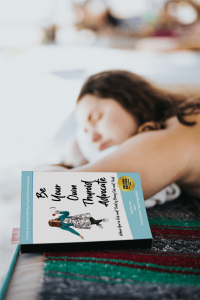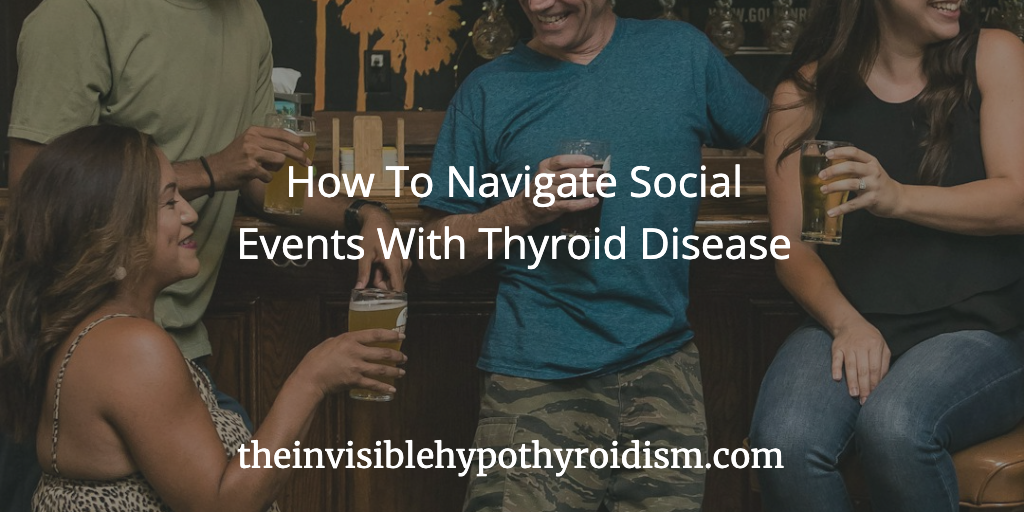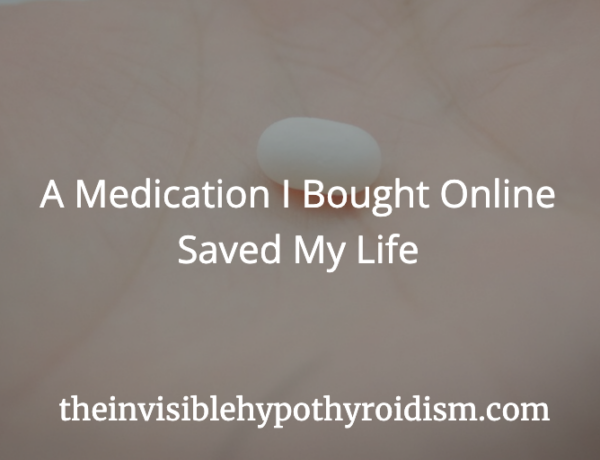Socialising when you have thyroid disease can be tricky. It can be draining, anxiety-inducing and overall just more difficult than it is for most people.
A range of issues and concerns around social events arise for many thyroid patients. These include having enough energy to get through the event, thyroid flare days occurring after a social event, worrying about dietary requirements being met (as many thyroid patients are gluten-free/dairy-free/soy-free/following another type of diet to help manage their thyroid condition) and even brain fog getting in the way of holding a conversation.
In past posts, I have discussed the various ways in which my autoimmune hypothyroidism has affected my own social life, as well as shared what other people with thyroid disease said about it affecting theirs. In this post, I’m going to share what has helped me to maintain a social life with thyroid disease, so that more of us can enjoy it again.
1. Managing My ‘Spoons’
Managing my energy wisely is really important when it comes to getting the most out of life. I like to use the ‘Spoon Theory’ for explaining how energy levels work with a thyroid condition.
Created by Christine Miserandino, The Spoon Theory explains that many people with a disability, chronic illness, health condition and/or autoimmune disease, must carefully plan their daily activities in order to use their ‘spoons’ wisely. [1]
‘Spoons’ are a unit of measurement used to track how much energy a person has throughout any given day. If you imagine that each task requires a certain number of spoons, which will only be replaced as the person rests, then it is easy to see that if you run out of spoons, you have no choice but to rest until your spoons are replenished.
Therefore, we must be conscious about how we use our ‘spoons’ or energy to get everything we want achieved. Those with a thyroid condition for example, may have to work out what activities they can afford to do each day, so as not to run out of energy and be left exhausted.
This is something I have got better at as time has gone on. Generally, if I have a social event in the evening, I try to rest during the day if I can, such as squeezing in a nap before I go out so as to recharge my energy reserves as much as possible. Making sure that I have plenty of time to get ready throughout the day can also be useful, as sometimes I have to take it slowly and get ready gradually.
When at the social event, I implement little tips and tricks I’ve learned help to conserve me more energy, such as taking a seat whenever possible. Even standing and talking can drain me quicker as opposed to sitting down, so I always take a seat if it’s free. If I take public transport to an event, I will also sit down where possible to reserve more of those ‘spoons’.
I often try to get the schedule or plan for the event ahead of time so that I can figure out how much of it I can honestly make e.g. if it’s an evening event on a work night, I know that I need to be prioritising getting home and in bed by 10pm, otherwise I’m risking my thyroid health taking a nosedive as a result and I work hard to keep my thyroid conditions under control.
It’s important to learn when to say “No” and be somewhat selfish with prioritising what you need in order to maintain a good life balance. When I am experiencing a dip in my health, I will often avoid evening events as they are just too tiring, and will opt for lunchtime and daytime events instead if possible.
It also often helps when I reserve the day or evening following an event, for resting up. Sometimes I don’t need it, but often I do. If I’m going to a particularly draining social event, I will even anticipate a flare up day and prefer to keep the day after free, just in case I need it for recuperating.
2. Being Mindful About Food and Drink
Making certain lifestyle and dietary changes have really improved my thyroid health. I gave up alcohol completely a while ago, as it triggered thyroid flares for me and made it impossible to get on top of my health for good. I also eat with a focus on healthy, wholesome food and keeping my blood sugar balanced, as having Hashimoto’s makes blood sugar issues more common. Therefore, I will often avoid sweet snacks at events, which can make me feel unwell half an hour later, as well as alcohol which always causes a flare up in my experience.
Being gluten-free due to my thyroid condition, it is also of paramount importance that I do whatever I can to avoid being ‘glutened‘ e.g. by looking ahead at menus or calling a restaurant to speak about food options, if I’m meeting people for a meal. This helps to reduce any anxiety about what I’ll be able to eat and know that my dietary requirement is being catered for. I really don’t want to experience unpleasant glutening symptoms whilst at the event itself or afterwards if I can avoid it.
3. Preparing for Thyroid Symptoms
Many of us experience common thyroid symptoms such as cold intolerance and brain fog.
To combat these, I will often take multiple layers of clothing me with, so that it’s easy to adapt to what my body needs (as some places are colder or better heated than others) as well as focus on having conversations with one person at a time, avoiding large groups which are harder to focus on and follow.
Related Article: Thyroid Patients Describe How Thyroid Brain Fog Feels To Them
4. Avoid Energy Suckers
For those of us who are quite sensitive to how others around us feel or project themselves, this can add another layer to the draining qualities of social events. I’m particularly sensitive to negative emotions (as I am a HSP) and tend to suck them up.
If I’m with someone who complains a lot and moans about everything, I soon find myself doing it and feeling rather negative, too. Happiness-suckers, those people we all know who, when we spend time with them, leave us wondering why we even bother, can be especially draining on our energy and raise stress levels. They’re not good for us to hang around with too often, if at all. So I avoid seeing these people and will limit or distance myself from people who make me feel drained.
If you’re at a group event, it can be easier to stay away from these people and focus on spending time with the ones who make you feel good.
5. Remember That You Don’t Have to Go
It is also important to remember that you don’t have to go to everything you’re invited to. In fact, if we all went to everything, we’d definitely be feeling run down and out of balance. Before my thyroid diagnoses, I was so guilty of this, meeting up with various people in the same day, which obviously left me feeling drained and stretched.
Prioritise any invites to social engagements and try to avoid ‘people pleasing’ or over committing yourself. Be realistic and don’t put too much in your calendar. I personally try to limit weekday evening social events to one a week and on the weekends, will try to see people on a Saturday and reserve Sundays for resting as much as possible. I used to cram my weekends with seeing everyone that wanted to meet up, which meant my whole life felt out of balance as I didn’t have the time or energy to get anything else done.
6. If You’re Hosting or Organising an Event:
Not all social meet ups happen outside the home. You may find yourself hosting or organising an event, too. If you do, make sure you get help with any preparations, such as cleaning the house, grocery shopping, putting up decorations and setting up games or activities. If possible, co-host an event so that it is not all on you to look after guests. You may want to consider hosting an event at a public location instead of your home, so that you don’t have the cooking and cleaning to worry about.
As mentioned above, planning in a rest day to let yourself recuperate and process afterwards can be a good idea too.
Do you have any tips or personal experiences to add? Let me know below.

The book Be Your Own Thyroid Advocate: When You’re Sick and Tired of Being Sick and Tired, which builds on this article in detail and covers the simple things you can do to resolve thyroid symptoms.
You can click on the hyperlinks in the above post to learn more and see references to information given.
References:
[1] https://www.butyoudontlooksick.com/articles/written-by-christine/the-spoon-theory/





